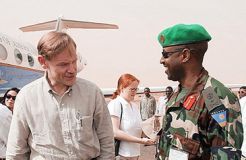US’s Zoellick visits Darfur
Nov 10, 2005 (NYALA, western Sudan) — A senior U.S. envoy studies conditions in Sudan’s Darfur region, where a split within the main rebel group has escalated violence, with fatal attacks on peacekeepers and assaults on aid workers that forced the U.N. to stop traveling on roads in the most volatile areas.
 U.S. Deputy Secretary of State Robert Zoellick flew to Darfur two days after telling leaders of the rebel Sudan Liberation Movement that they risk losing credibility and international sympathy if their internal power struggle undermines efforts to find a political solution to the humanitarian crisis.
U.S. Deputy Secretary of State Robert Zoellick flew to Darfur two days after telling leaders of the rebel Sudan Liberation Movement that they risk losing credibility and international sympathy if their internal power struggle undermines efforts to find a political solution to the humanitarian crisis.
At talks with rebel leaders and commanders in neighboring Kenya, Zoellick also pressed the factions to craft a common negotiating position in order to speed up progress when talks resume with the government on power- and wealth-sharing arrangements.
While in Darfur, Zoellick was expected to hold talks with leaders of Arab tribes who have stayed out of a conflict often described as one pitting ethnic Arabs against ethnic Africans. Zoellick also was expected to visit one of the first centers for helping victims of rape in the region.
After decades of clashes over land and water in Darfur that often pitted the region’s ethnic Arab tribes against its ethnic African tribes, conflict erupted on a wider scale in February 2003. Then, the Sudan Liberation Movement and the other major rebel group, the Justice and Equality Movement, took up arms against the Sudanese government amid accusations of repression and unfair distribution of wealth.
The central government is accused of responding by unleashing ethnic Arab tribal militias known as Janjaweed to murder and rape civilians and lay waste to villages. The Sudanese government denies backing the Janjaweed.
The United Nations estimates that 180,000 people have died, mainly through famine and disease. No firm figures exist on the number killed in fighting. Several million more have either fled into neighboring Chad or been displaced inside Sudan. Most of those who fled now live in sprawling camps, kept alive by food and medical care provided by aid workers.
Rape and other violence against women is common in the camps. Arab militia sometimes attack. During a recent raid, hundreds of Arab militia, mounted on horses and camels, burned shelters and killed at least 30 people.
The presence of smaller, armed groups that were formed by ex-rebel fighters has made the situation more volatile, said Jan Pronk, special U.N. envoy to Sudan.
Last month, two Nigerian peacekeepers were killed in a gunfight with armed men who were robbing an African Union civilian contractor. Dozens of AU military observers and other staff were later abducted by insurgents.
“The situation is uncertain _ not everywhere, but in a number of places, particularly in West Darfur” state, Pronk said after meeting with Zoellick Wednesday in Khartoum.
The U.N. evacuated its staff from West Darfur some two weeks ago, stopped the delivery of humanitarian supplies by road and told workers to use helicopters to supply the camps.
Some 7,000 African Union peacekeepers deployed to stabilize Darfur have been unable to stem the spike in violence, because they do not have enough troops, proper military hardware and means for rapid movement in the region the size of France, Pronk said.
There are also reports that the peacekeepers are running short of ammunition, Zoellick said late Wednesday.
The African Union has repeatedly asked for more money and logistical support from the West for its Darfur operations.
New York-based Refugees International, which provides humanitarian assistance and protection to displaced persons around the world, said donor governments have failed to provide adequate support for the AU, while the Sudanese government places “innumerable obstacles in its path.”
“With the recent upsurge in violence over the past two months, the African Union’s shortcomings have come into full focus,” Refugees International said in a report released Wednesday, adding that the United Nations must eventually assume responsibility for security in Darfur.
The British charity Oxfam said Wednesday that the AU peacekeeping mission in Darfur needed help from the international community.
“If the African Union mission in Sudan does not receive the financial and logistical means to fully implement its mandate and take its troops to their full strength, the international community is setting the AU up for failure and turning its back on Darfur,” Malcolm Fleming, of Oxfam in Scotland, said after a visit to Darfur.
(AP)
